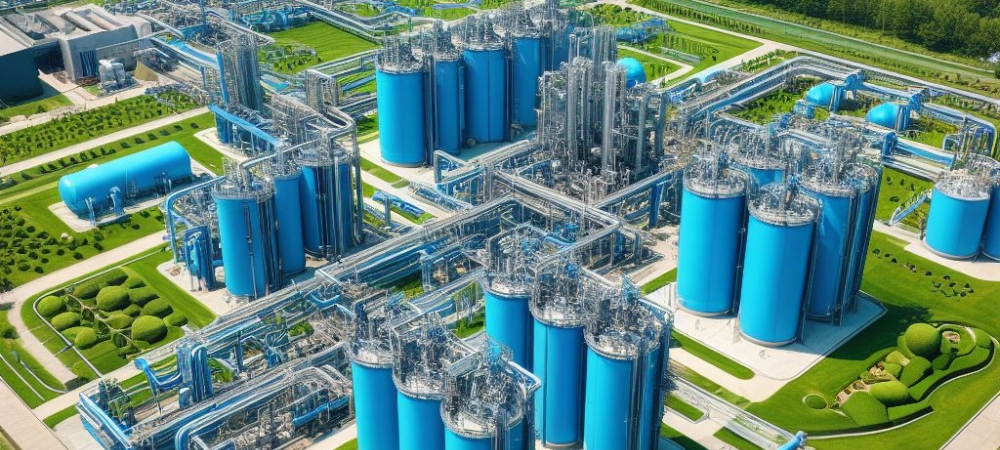Fri 24 Nov 2023
In a world looking for sustainable energy solutions, hydrogen is emerging as a versatile and innovative solution. We asked our Corporate Innovation Manager at the CIS Group for some insights into recent developments in the hydrogen market, which is increasingly being explored by major energy companies.

Hydrogen at the heart of tomorrow's challenges
Energy, at the heart of ecological and geopolitical concerns, is crucial to the future of our civilisation. In the face of ever-increasing energy needs, and despite efforts to reduce consumption, we need to diversify our energy mix, and in particular find abundant, sustainable, clean and accessible alternatives. In this context, hydrogen, which has been used since the 19th century, is emerging as a multi-purpose solution to today's problems.
What is hydrogen?
Hydrogen, a light gas, is the most abundant element in the universe, although it does not occur naturally on Earth. Its production, at 74 million tonnes worldwide, represents less than 2% of global energy consumption. Thanks to hydrogen fuel cells, hydrogen is becoming a versatile energy carrier, used for everything from energy storage to supplying electricity for buildings or powering vehicles. There are 3 types of hydrogen:
GREY hydrogen: Produced from fossil fuels, this hydrogen, which emits a lot of carbon, is set to be replaced in the next few years by blue and green hydrogen.
BLUE hydrogen: Also produced from fossil fuels, but combined with a carbon capture and storage process, this solution makes it possible to use existing installations while neutralising CO2 emissions.
GREEN Hydrogen: Produced from water and renewable electricity via an electrolysis process, this promising solution could enable decarbonisation and energy sovereignty.

Green hydrogen, as a complement to electricity, represents one of the levers of the future for accelerating the development of green mobility and the decarbonisation of industries.
1/ CIS has always been positioned in the energy markets, and this market is gradually developing its hydrogen component. Can you explain why?
The hydrogen market is indeed developing rapidly, mainly because of its key potential in the energy transition towards a less carbon-intensive model. Its combustion produces nothing but water, which is a huge advantage compared with carbon-based energies. What's more, hydrogen production can be coupled with the production of renewable energy, and used as a means of energy storage. Hydrogen can also be used as the alternative of choice to hydrocarbons in certain heavy industries (iron and steel, chemicals, cement, etc.) to reduce the emissions linked to the energy needed for the processes in these industries. Major industrial and oil groups have already carried out a number of successful tests in this area, both economically and ecologically.
2/ What challenges do you foresee in terms of infrastructure to support the use of hydrogen in the so-called isolated environments in which CIS operates?
Hydrogen production is not new, but interest in it is fairly recent. The cost of producing it by electrolysis of water is still somewhat high, and will have to come down if it is to be economically viable for small volumes. What's more, to be really interesting, it needs to be coupled with renewable energies, which, although growing rapidly at the moment, are still limited. Finally, the storage infrastructure, distribution and use of hydrogen need to be improved to facilitate its use.
"However, progress is being made very rapidly, and some countries are emerging as pioneers - particularly in Asia, where investment is colossal and the outlets already tangible."
3/ How should this development impact CIS's activities? (Geographic markets? Infrastructures, etc.)
The shift towards hydrogen in certain industries will be gradual, as many players still have massive investment portfolios in the Oil & Gas segments. However, we will see major investments over in the next decade. In this regard, we are going to see what we have been seeing for some years now in the shift towards the LNG market, which is considered to be cleaner than oil as such: the development of adapted maritime transport vessels, the increasing geographical segmentation of markets, the emergence of new local or regional players in the production, storage and transport of hydrogen, and competition between different players and production methods for this worldwide hydrogen. To be virtuous, hydrogen must be coupled with renewable energies. We are likely to see more and more energy "super projects" or "mega projects" coupled with hydrogen production and storage capacities, which represent potential markets for CIS in the construction and start-up phases.

4/ How will CIS adapt to the changing needs of the hydrogen industry?
Fundamentally, CIS will only have to adapt a little to position itself in this market segment as part of hydrogen construction or production projects - it's simply a question of following this market and its developments, and positioning itself in the resulting calls for tender. A number of major energy players are already positioning themselves in the hydrogen market. Our client portfolio may expand with the arrival of new actors, but some of our current clients will still be present in this market.
5/ Are there any emerging hydrogen-related technologies that CIS is considering incorporating into its services, and how can this improve its operational efficiency?
The impact of hydrogen on our operations, particularly as part of a more responsible life base, can be manifold. As explained, its production can be linked to renewable energy production (such as solar power), and in this case hydrogen becomes an alternative method for storing energy, which is less polluting and less energy-hungry than certain large batteries, which consume a lot of lithium. This hydrogen can then be used to generate electricity again when needed (at night, for example), or for mobility. By treating and then reusing technical water on site, coupled with renewable energy, we could find ourselves in the presence of a source - modest, admittedly, but real - of sustainable mobility on site, with less impact.
The impact of hydrogen on our operations, particularly as part of a more responsible life base, can be manifold.






